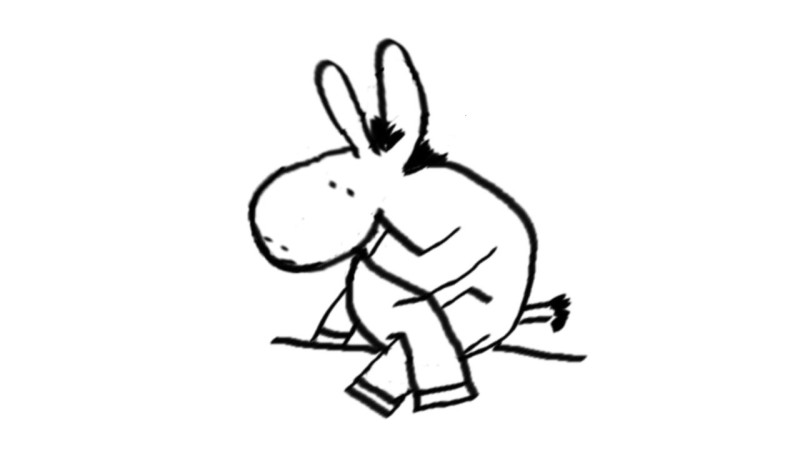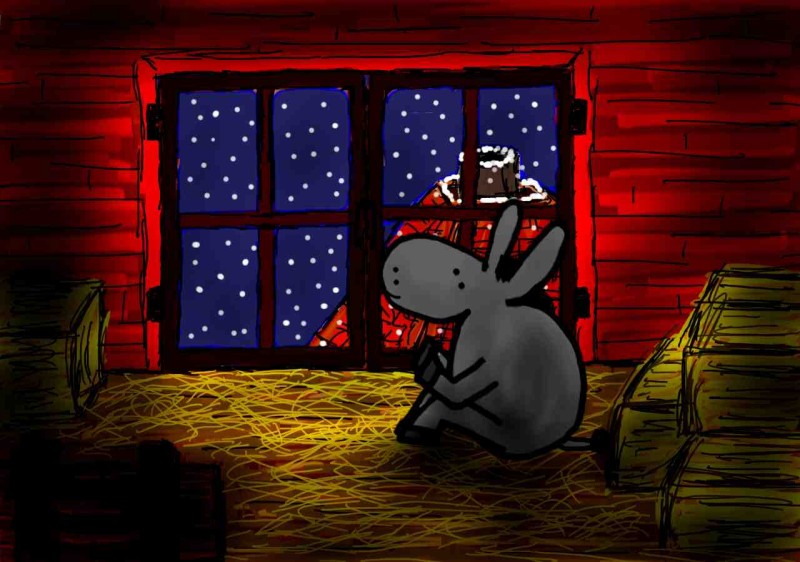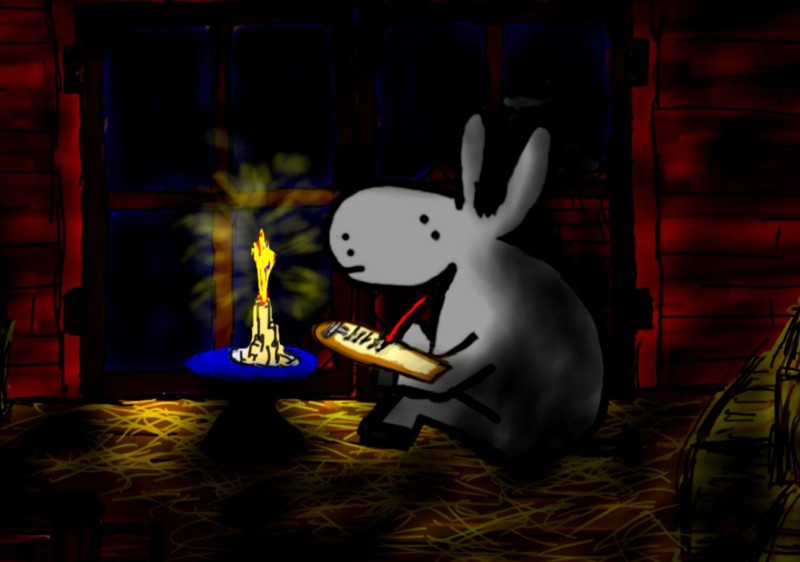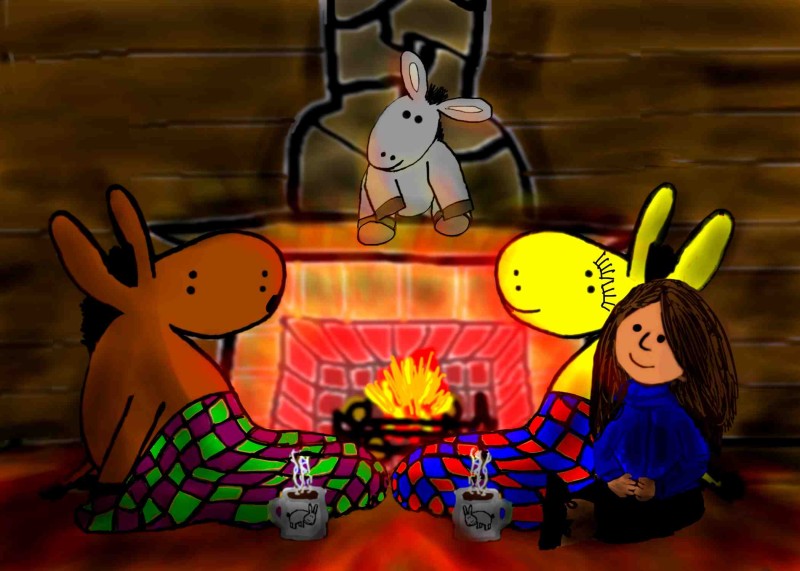As soon as I put it into words,
it ceases to be what it is.
Category: Philosophy
“Blurtso looks at the snow” (XX)
“Graham Cracker Crumbs” (III)
“Lizzy”
A single obsession of light,
a single smile
in the soil of the soul,
a flash in the shadow,
a burning planet,
a single note from the spheres.
A single light illuminating
the water’s crash
at the cliffs of the heart,
a leaping light of statues
erected and razed in the foam,
an undulating light reflecting
the swell and hollow and sway.
A simple light persisting,
in absence,
an extinguished star that continues.
“Bonny tells a bedtime story”
Would you like to hear a bedtime story? said Bonny. Oh yes! said Ditto. Oh yes! said Virginia. What’s it called? said Ditto. It’s called, said Bonny, “Enough is Enough.” That’s a strange name, said Virginia. Yes, said Ditto, a very strange name. It’s a story about a little donkey and a little girl, said Bonny. Named Ditto and Virginia? said Ditto. Yes, said Bonny. Oh boy, said Ditto, I can hardly wait! Yes, said Virginia, please tell us! Very well, said Bonny, it goes like this:
Once upon a time there was a donkey named Ditto. Ditto lived in a castle on the edge of a river. The castle was ruled by a king named Rupert. Across the river was a castle and a king named Richard. The river that separated the two castles was wide and black. It flowed from the remains of a forest that was deep and green.
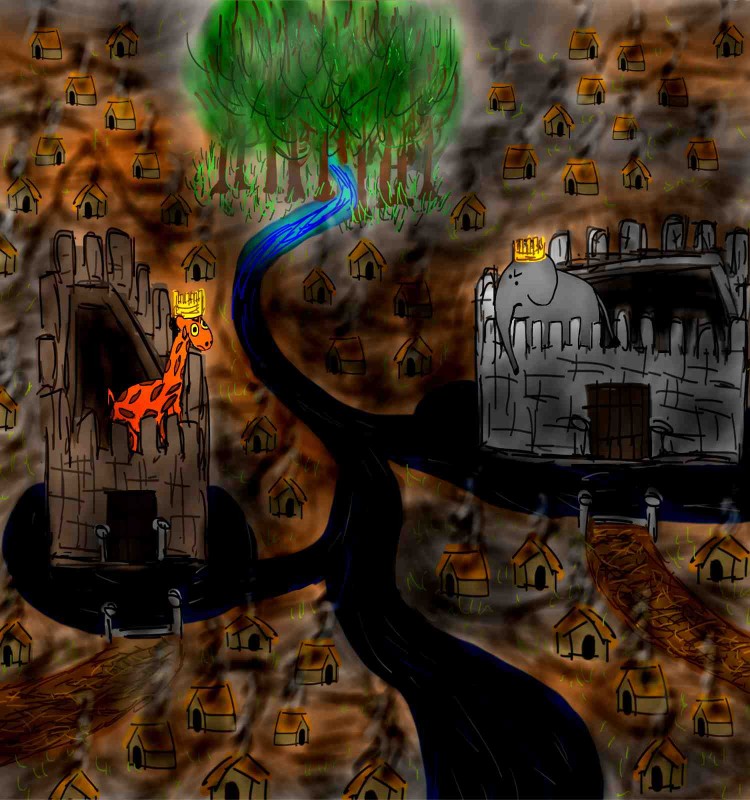
The two castles made enormous demands on the land. They consumed wood from the forest, water from the river, and every kind of fruit, vegetable and animal they could eat. They consumed so much that soon they would have nothing left, but they couldn’t imagine living any other way. Their life seemed as natural to them as the contaminated air they breathed, and the contaminated land they worked.
Now, Ditto was a mischievous donkey who liked to wander off. One day, when he was wandering, he came to a bridge that crossed the river, and half-way across he met a girl named Virginia.
“I’ve got to go home,” said Virginia.
“So do I,” said Ditto.
“King Richard closes the bridge at dusk,” said Virginia.
“King Richard?” said Ditto. “You mean King Rupert.”
“No,” said Virginia, “I mean King Richard.”
Ditto had never met someone from the castle of King Richard and Virginia had never met someone from the castle of King Rupert. But though Virginia had been taught to hate everyone from the castle of King Rupert and Ditto had been taught to hate everyone from the castle of King Richard, Ditto couldn’t hate Virginia and Virginia couldn’t hate Ditto, because they had already begun to like each other before they remembered they were supposed to hate each other.
King Rupert and King Richard hated everything about each other, even though they were exactly the same. They hated each other because they each wanted all of the land and all of the water and even all of the air. Because neither one ever had enough of anything. They were insatiable. They ate so fast that they didn’t taste their food, and they were in such a hurry that they never enjoyed anything. They could never have enough, and what was worse, they had been so unsatisfied for so long that they both believed there was no other way to be.
Sometimes the peasants got angry and restless and began to complain. And whenever they did, the Kings would hold a jousting tournament to distract them, or they would rekindle the war with the enemy castle, and then the peasants would turn their anger on the enemy castle and forget for the time being to hold their own king accountable.
Both Ditto and Virginia knew that they would be punished if they were found playing together. The only place they could play and not be seen was in the woods, so, with some trepidation, they began to play on the fringes of the forest. One day when Virginia was chasing a butterfly, and Ditto was following, the butterfly flew so deep into the forest that Ditto and Virginia became lost. Ditto and Virginia were very scared when they realized they were lost.
They began to realize that they didn’t need a big castle and they didn’t need the excess. They learned the lessons of the forest of Enough is Enough.
“We should return to our castles and teach them all that we’ve learned,” said Virginia.
“Yes,” said Ditto, “and we could plant trees on the land and clean up the river.”
And so Ditto returned to the castle of King Rupert and Virginia returned to the castle of King Richard. Ditto told King Rupert all that he had learned in the Forest of Enough is Enough, and Virginia told King Richard all that she had learned. As soon as King Rupert heard what he heard and King Richard heard what he heard, the two kings called an immediate truce to their fighting and held a secret meeting deep in one of the rooms of the castle of King Rupert.
The next day King Rupert announced that he had encountered a threat even greater than King Richard, and King Richard announced he had encountered a threat even greater than King Rupert, and that King Rupert and King Richard were going to unite to overcome this new threat. And the next day the armies of King Rupert and King Richard charged into the remains of the forest of Enough is Enough and razed it to the ground.
“Now,” said King Rupert and King Richard in unison, “we can get back to hating each other and consuming what we want to.”
“Welcome home” (XX)
Ode to the quiet in your neighborhood
The quiet
in your neighborhood
is a living quiet,
filled with regular,
consistent sounds,
and intermittent sounds
that accentuate
the quiet.
There is
just enough noise
to remind us
that we’re living
in a living world,
but not enough
to distract us
when we’re lost
in conversation.
I remember I heard
you complain
about the morning cars
that pass on the street,
and I was surprised,
not by the cars
that didn’t bother me,
but because
I had so rarely
heard you complain.
“Welcome home” (XIX)
Ode to your backpack by the door
Lightly filled backpack,
waiting by the door,
waiting to take its place among
the provisions in my van,
waiting to be transported
to pine-forest evenings
and mountain-morning streams,
you are the image of economy,
the essence of the one I love,
you are all my love needs,
when she distills her happy home
to its few essential things.
Simple backpack she carries
whenever she strays from home,
whether flying south to meet me,
or driving to watch the leaves,
you’re the lightness of my love,
the incarnation of adaptability,
the endearing lack of excess
of a peaceful, uncomplaining heart.
My love is joyful and content
wherever she is and whatever she does.
She’s modest, natural, and kind,
and as helpful and unassuming
as the simple pack she carries.
“Welcome home” (XVIII)
Ode to your bed
The evening flows in
through the windows,
and you go to your bed
to journey through the night.
Ship of dreams
and candlelight voyage,
sailing under starry skies,
your bed is where you go
to give yourself,
unguarded and exposed,
to your lover,
or to sheltering sleep.
Your high, sturdy bed
remains unchanged,
night after night,
standing on its sturdy legs,
while you shift and alter
determining who
it will hold tonight.
Will you bring it passion or peace?
Insomnia or repose?
Will you emerge restless or rested,
anxious or at ease?
Sometimes your bed
is a valley in bloom,
with soft grass and flowers,
and other times it’s a beach.
Your sheets are the waves
of a warm ocean
that rock you to sleep.
On those fortunate nights
when we go to sleep together,
the same bed that supports us
carries us through different
journeys and dreams,
and you wake, from time to time,
to listen to me breathe.
And when the morning finally comes,
and I wake and reach out
to find your familiar form,
I discover you’re already up,
already dressed and at the table,
typing out hellos
to greet the new day.
“Welcome home” (XVII)
Ode to your Christmas decorations on the mantel
Idealized image of home,
simple pattern from a simple time,
school, drugstore, house, hotel,
buildings that softly shine.
It’s a world of imagination
from the heart of the little girl,
who lives within the woman
that arranged this loving world.
I sit back in my chair,
and you sit back in yours,
admiring the invented village,
its bright windows and bright doors.
(The flicker of electric candles
moves the skaters on the pond,
and the cotton among the trees
makes us glad we’re safe and warm).
It’s a setting of wished-for scenes,
built on love and being kind,
where people help each other,
and are glad to share their time.
You’ve spent your year in meetings,
in classrooms and county halls,
fighting to help the schools
break down dividing walls,
but tonight you’ll go with me,
on a journey through your town,
hand in hand through imagination,
beneath its starry crown.
I sit back in my chair,
and you sit back in yours,
admiring the invented village,
its bright windows and bright doors.
And tomorrow we’ll sit down
with the Grinch and Charlie Brown!
“Welcome home” (XVI)
Ode to my guitar in your living-room closet
Closed in your closet,
next to the vacuum,
leaning against the wall
with its head in the coats,
my guitar dutifully waits.
Hand-made guitar
of rosewood and cedar,
Spanish guitar that kissed you
with body vibration
and starry sound.
Each day it waits in silence,
remembering the times it touched you.
It remembers in the darkness,
beneath the coats, alone.
(But sometimes a Patagonia jacket
will rest a sleeve upon its shoulder).
“Welcome home” (XV)
Ode to the dimmer switch on
your dining-room light
Dawn, mid-day, dusk:
with your dimmer switch
you create
any time at any time.
The evening begins
with the brightness of day,
with the table illuminated
by the full glow
of the dining-room light,
and it continues to burn
with its mid-day shine,
while you toil in the kitchen,
chopping and seasoning,
heating and cooling,
stirring and simmering
the evening dish,
but when the recipe is ready
and the plates reach the table,
the dazzling sun is dimmed
to a twilight tint that tempers,
that darkens and disguises
the objects of day.
Later, when the plates
are withdrawn
and the switch is dimmed anew,
your iPod plays a tune,
and we dance in the kitchen,
arm in arm,
in the gentle glow
of the electric moon.
